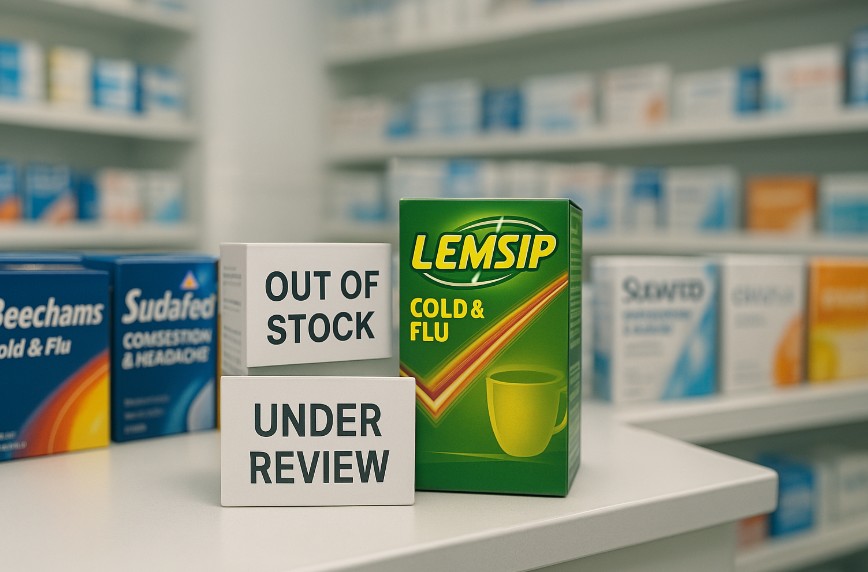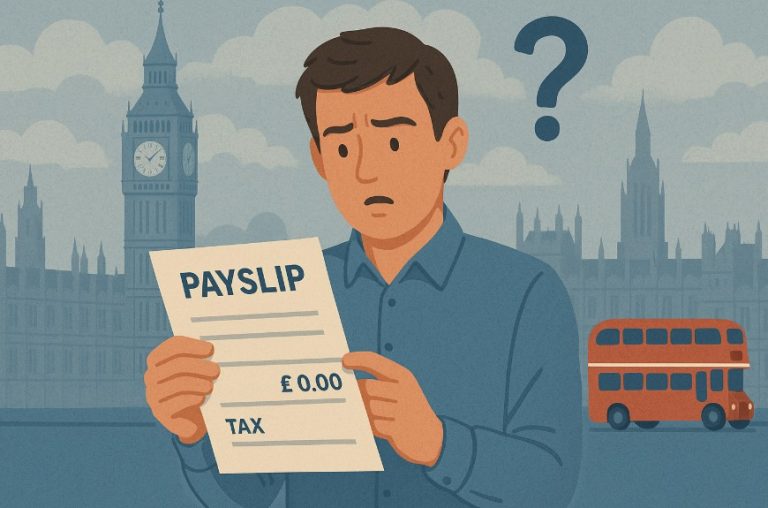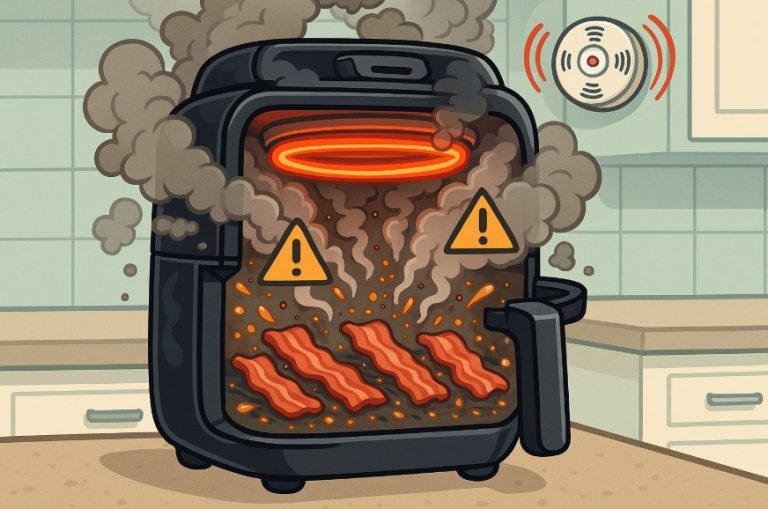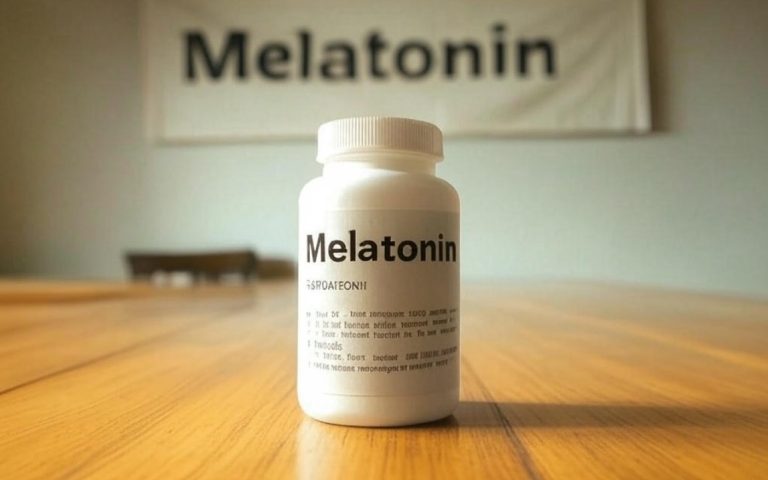Why Is Lemsip Banned in the UK? The Truth Behind the Popular Cold Remedy
In November 2024, headlines across the UK and US media brought a surprising twist to the winter healthcare conversation.
The US Food and Drug Administration (FDA) announced a proposal to withdraw certain cold and flu medications specifically those containing phenylephrine from pharmacy shelves. The rationale? Mounting evidence suggesting that phenylephrine, a decongestant used in many over-the-counter remedies like Lemsip, simply doesn’t work when taken orally.
Lemsip, long considered a staple in British households during flu season, suddenly found itself at the centre of a growing health debate.
From offices to pharmacies, the question echoed: Why is Lemsip being considered for a ban? Is it safe? Effective? Or are consumers being sold a product that offers more comfort than cure?
This article breaks down the facts behind the phenylephrine controversy, examines expert opinions, and evaluates what consumers in the UK need to know moving forward.
Why Is Lemsip Banned?
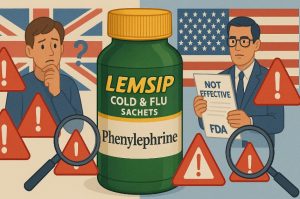
As of early 2025, it’s important to clarify: Lemsip is not banned in the UK. It is, however, under growing scrutiny due to the inclusion of phenylephrine hydrochloride in most of its oral formulations.
Phenylephrine has been used for decades as a nasal decongestant. In oral cold medications like Lemsip sachets and tablets, it is intended to reduce swelling in the nasal passages to relieve congestion.
But in 2024, the FDA released findings suggesting phenylephrine is ineffective when swallowed, as it doesn’t reach the bloodstream in significant amounts to have a therapeutic effect.
These findings led the FDA to propose a withdrawal of oral phenylephrine-based medications from US pharmacies, a move that could set a precedent for other nations including the UK.
In response, several British healthcare professionals began to question whether similar action should be taken in the UK. Some even argued that millions of consumers have been misled for years, buying cold and flu remedies that may not be doing what they claim.
What Ingredients Are in Lemsip?
To understand the debate, it helps to look at what’s actually in Lemsip. The standard Lemsip Cold & Flu sachet contains:
- Paracetamol (500mg–1000mg): A painkiller and fever reducer.
- Phenylephrine Hydrochloride (12.2mg): A nasal decongestant.
- Ascorbic Acid (Vitamin C) – in some variants.
- Caffeine or Guaifenesin – included in stronger formulations like Lemsip Max.
The key issue revolves around phenylephrine, which has become the subject of international medical scrutiny.
How Do the Ingredients in Lemsip Work?
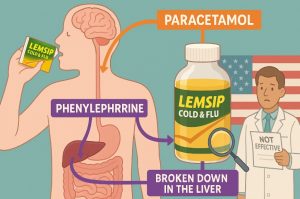
Paracetamol
Paracetamol is a well-established and effective medication used to relieve mild to moderate pain and reduce fever. It works by inhibiting prostaglandins chemicals in the brain that signal pain and inflammation.
Its efficacy is widely supported, and it is one of the most trusted non-prescription medications in the world.
Phenylephrine
Phenylephrine’s mechanism of action is more complex. It is a vasoconstrictor, meaning it narrows blood vessels. When applied topically as in a nasal spray, it can directly reduce swelling in nasal tissues, helping users breathe more easily.
However, when phenylephrine is taken orally, it has to pass through the digestive system. Here, the liver breaks it down significantly before it can circulate in the blood, a process known as first-pass metabolism.
As a result, very little of the drug ever reaches the nasal passages to have any meaningful effect.
Dr Hisham Al-Obaidi, a pharmacy lecturer and advanced practitioner, summarised the issue:
“Although phenylephrine is absorbed into the bloodstream, it is extensively broken down in the liver, resulting in little to no pharmacological effect.”
What Do Experts Say About Phenylephrine?
Following the FDA’s announcement, UK experts began voicing similar concerns. They argue that the continued sale of oral phenylephrine products may be more about tradition and marketing than medical benefit.
Professor Ron Eccles, former director of the Common Cold Centre at Cardiff University, has long questioned phenylephrine’s oral effectiveness:
“When taken orally, phenylephrine is ineffective as a decongestant because it is metabolised in the gut and liver before it reaches the nose. My view is that these products should be discontinued.”
Meanwhile, Dr Leyla Hannbeck, CEO of the Independent Pharmacies Association, stated:
“It is time for regulators to intervene and give pharmacists the support to make informed decisions. Science now proves oral phenylephrine is not effective, and there are better alternatives.”
Dr Helen Wall, a practising GP, added that while these products may be comforting due to their warmth and familiar ritual, they don’t offer substantial decongestion:
“If it helps, then it’s not a waste of money psychologically. But phenylephrine’s effectiveness is still questionable, and its risks such as increased blood pressure shouldn’t be overlooked.”
Is Lemsip Actually Banned in the UK?
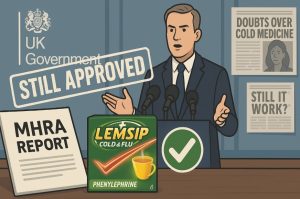
Despite mounting scientific evidence and growing professional consensus, the UK’s Medicines and Healthcare products Regulatory Agency (MHRA) has not yet banned or recalled Lemsip. In a statement, the MHRA said:
“There have been no new safety concerns identified with phenylephrine-containing products. People can continue to use them as directed.”
MHRA Chief Safety Officer, Dr Alison Cave, added:
“All available data is carefully reviewed when authorising any medicine, and we continue to monitor all medicines for safety and effectiveness.”
However, many see this as a cautious stance. Experts argue that the issue is not safety, but efficacy. The FDA made clear that their proposal was based not on safety concerns, but on the lack of evidence for effectiveness.
This means that while Lemsip is still legally sold and used in the UK, that may change if consumer pressure and global regulatory trends continue to grow.
What Are the Side Effects of Using Lemsip?
While the risk of side effects is generally low when Lemsip is used as directed, both paracetamol and phenylephrine carry risks, particularly when overused or used incorrectly.
Phenylephrine side effects may include:
- Elevated blood pressure
- Anxiety or restlessness
- Headaches
- Sleep disturbances
Paracetamol risks include:
- Liver damage from excessive use
- Risk of overdose when used alongside other paracetamol-containing products
Some medical professionals are especially concerned about the hidden risks of combination medications, where consumers unknowingly take multiple products containing paracetamol.
Are There Effective Alternatives to Lemsip?
There are several safer and potentially more effective alternatives for treating cold and flu symptoms many of which do not rely on phenylephrine.
Recommended options include:
- Paracetamol tablets or syrup for fever and aches
- Ibuprofen for inflammation and pain
- Nasal sprays (e.g. xylometazoline or oxymetazoline), which act locally and are more effective for congestion
- Steam inhalation with menthol or eucalyptus
- Plenty of fluids, rest, and immune-supporting foods like citrus fruits and soups
These options are not only supported by the NHS but are frequently endorsed by GPs and pharmacists as effective first-line treatments for cold symptoms.
What Should UK Consumers Do Now?
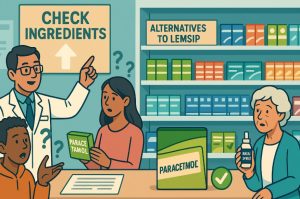
For now, UK consumers can still legally buy Lemsip and similar products. However, being informed is key. Consumers should:
- Read packaging carefully and be aware of ingredients
- Avoid taking multiple products containing paracetamol
- Recognise that phenylephrine may not be effective when swallowed
- Ask pharmacists for advice on evidence-based alternatives
- Stay updated with MHRA statements and NHS guidance
By taking a cautious and informed approach, consumers can avoid unnecessary medications and focus on what actually works.
How Does Lemsip Compare to Other Cold Remedies?
| Product | Phenylephrine (Oral) | Paracetamol | UK Status | Effectiveness Noted |
| Lemsip | Yes | Yes | Under review | Effective only for pain relief |
| Beechams | Yes | Yes | Under review | Similar to Lemsip |
| Sudafed | Yes (oral) / Nasal | No | Limited oral sale | Nasal spray effective |
| Ibuprofen | No | No | Widely available | Reduces inflammation and fever |
| Saline sprays | No | No | Available | Clears nasal congestion naturally |
Should People in the UK Still Use Lemsip?
Whether Lemsip remains part of your medicine cabinet should depend on your symptoms and your expectations. If you’re looking for pain and fever relief, the paracetamol in Lemsip is effective and trusted.
However, if you’re relying on it to clear a blocked nose, experts increasingly agree that you’re unlikely to see much benefit from the phenylephrine content.
With evidence mounting against the effectiveness of oral phenylephrine and safer alternatives available, many healthcare professionals now advise opting for more targeted remedies, particularly nasal sprays or simple paracetamol on its own.
FAQs About Lemsip and Its Ban in the UK
Is Lemsip completely banned in the UK?
No. Lemsip is still legally available. However, experts are calling for oral phenylephrine products to be reviewed and possibly withdrawn.
Why is phenylephrine considered ineffective?
Studies show that when taken orally, phenylephrine is broken down in the liver before it reaches nasal tissues, making it ineffective for decongestion.
Are phenylephrine nasal sprays still effective?
Yes. Nasal sprays deliver the drug directly to the site of action, bypassing the digestive system and providing fast relief.
What are the health risks of taking Lemsip regularly?
Potential side effects include raised blood pressure, insomnia, and if overdosed, liver damage from paracetamol.
Why hasn’t the MHRA banned Lemsip?
The MHRA states there are no new safety concerns. Their current stance is that the product is safe if used as directed.
What are trusted alternatives to Lemsip?
Paracetamol, ibuprofen, nasal decongestant sprays, and natural remedies such as ginger, lemon, and honey are effective options.
Will the UK follow the US in banning oral phenylephrine?
It’s possible. The FDA’s findings may influence other regulators. If pressure continues to mount, the MHRA may reconsider.

